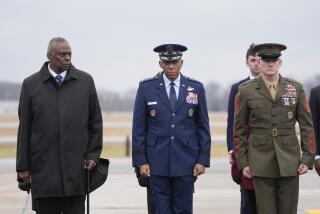Deadly Attacks Pockmark Iraq
- Share via
BAQUBAH, Iraq — Insurgents used a roadside bomb Monday to blow up another Bradley fighting vehicle, killing two American soldiers and wounding four others.
The attack in southwestern Baghdad marked the second time in four days that a Bradley was heavily damaged by a roadside bomb. A Jan. 6 attack in northern Baghdad killed seven U.S. soldiers.
The heavily armored Bradleys were thought to be less vulnerable to homemade bombs, known in military terms as improvised explosive devices. But recent deadly attacks suggest that insurgents have shifted to larger bombs or found a way to penetrate the Bradley’s armor.
The attack on the Bradley was among several deadly incidents in Iraq on Monday. A U.S. soldier mistakenly killed a 13-year-old girl outside a base near this central Iraqi city of Baqubah, the latest in a string of civilian deaths that might stoke anti-American sentiments in the final weeks before national elections.
A roadside bombing killed three Iraqi national guard soldiers and wounded six during a joint patrol with U.S. troops in the restive northern city of Mosul, said Maj. Andre Hance, a U.S. military spokesman. There were no American casualties, he said.
As interim Prime Minister Iyad Allawi claimed successes in the government’s campaign to capture insurgent leaders, a suicide bomber struck a Baghdad police station, killing at least six people. In the southern Baghdad suburb of Dora, gunmen assassinated the deputy Baghdad police chief and his son as they drove to work.
Capt. Marshall Jackson, a spokesman for the 3rd Brigade Combat Team that oversees the area around Baqubah, called Monday’s shooting, which also injured a 14-year-old boy, “an absolute tragedy.”
The incident took place when a U.S. soldier in a guard tower spotted smoke outside the base and opened fire. A team sent to investigate found the two children. The boy was evacuated to a hospital in the nearby city of Balad. Jackson said the military has launched an investigation.
The shooting brings the accidental death toll for Iraqis from U.S. fire to at least six and perhaps as many as 20 over the last three days. On Saturday, a U.S. jet dropped a 500-pound bomb on the wrong house in a village near the northern city of Mosul. The U.S. military expressed its regret for the incident, saying the bomb was intended for another location as part of a search for a local insurgent leader.
Casualty estimates varied, with the U.S. setting the number at five and residents saying 14 people were killed, all from the same family.
A day later, five people were killed, including two police officers, when U.S. troops opened fire after a car bomb attack on their convoy, an Iraqi Interior Ministry spokesman said. The U.S. military said at the time that it had no information on the incident.
A U.S. spokesman denied Monday that American soldiers were responsible for killing the Iraqi officers, and the Interior spokesman who had issued the report backed away from it.
The spate of accidental deaths might have implications for the coming elections. A surge in anti-U.S. feelings before the vote could damage the standing of the parties in the U.S.-appointed interim government and enhance the appeal of parties calling for an end to the foreign military presence in Iraq.
The attack on the police station occurred when a suicide bomber drove his vehicle inside the police compound in the southern Baghdad neighborhood of Zafaraniya.
Like all Baghdad police buildings, the station is surrounded by concrete walls, gravel-filled barriers and vehicle checkpoints. But the bomber penetrated the cordon using a truck that looked like an official police vehicle, witnesses said.
The shooting of Brig. Gen. Amer Ali Nayef, the deputy police chief, and his son came less than a week after gunmen killed the governor of Baghdad, Ali Haidari.
Despite the intensifying violence, Allawi declared that Iraqi security forces were slowly winning the battle against the insurgency. Allawi displayed pictures of several captured insurgent leaders and confiscated weapons caches during a Baghdad news conference.
Interrogation of captured insurgents has yielded useful intelligence to help the government chip away at the insurgency, he said.
“As we arrest more people, we get more information and we improve our performance,” he said. “We must offer our thanks to the heroes in the Iraqi police and national guard.”
Allawi also repeated his oft-stated commitment to holding elections Jan. 30. His government, he said, “has two duties. One is to make sure the elections take place and two is putting security on the right track.”
He denied any knowledge of recent local news reports that claimed the entire staff of the Iraqi electoral commission for Al Anbar province -- which contains the rebellious Sunni Muslim strongholds of Fallouja and Ramadi -- had resigned because of threats and had gone into hiding.
The regional newspaper Al Anbar quoted the head of the local commission as saying that electoral officials were “kidding themselves” if they thought the vote could take place on schedule in the province.
Allawi said he had met with the electoral commission officials Sunday and no resignations had been mentioned.
Special correspondent Suhail Affan in Baghdad and Times wire services contributed to this report.
More to Read
Sign up for Essential California
The most important California stories and recommendations in your inbox every morning.
You may occasionally receive promotional content from the Los Angeles Times.













